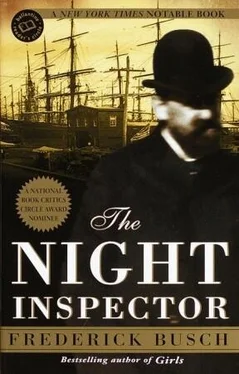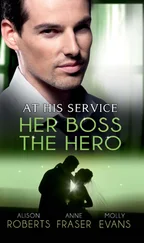The tent, you might think, would protect a group of men from my vision and my fire. But what the Rebels had not considered was that I might eschew, this time, the safety of the trees and, in my camouflage, crawl — wriggle, really, never raising my arms from my sides — an inch and even less at a time through marshy grass and cow pies and wild thyme, pausing to breathe facedown, then crawl blindly ahead, dragging the Sharps and hoping I would not foul the mechanism with moist earth or excrement. When my head touched the pit mound of the great birch at which, hundreds of yards and many hours before, I had aimed myself, I stopped. A blackbird from the swamp whistled and screeched. He might as well have been a Rebel picket, I thought. I lay my head upon my arms and waited for the bird to become accustomed to me. I breathed in the scent of the grass I had crushed with my body, and the bitter, dark smell of birch roots, the bright saltiness of my own heated flesh.
When I heard him call from bushes some dozens of yards from me, and then from the marsh, I began to bring my piece along my body, inspecting the muzzle and sights and chamber as it traveled my length. Mud daubers had made a nest in the rotted tree; two of them stung me, and I held my breath, waiting to see if the colony would surge at my eyes and ears and mouth. One went after my hand, and I watched him and did not move. It was a cold kind of pain that spread along the surface of the skin. I then watched shadows grow longer. I could not catch their motion, no matter how open-eyed my stare: First they were short, then, magically, long, and then they were much longer.
It was time to remove my forage cap and look over the fallen birch tree. What they had not reckoned on, you see, was the orange-crimson glare of the setting sun that poured down and through the tent. Just before sundown as it was, the men inside were silhouetted, and I did not gamble on the sun’s low glow along the barrel of the Sharps. I hastened, taking one, and then another, and they were clean kills, I think. They dropped like dead men. The third target howled, and he might have survived, though it was thousands of pounds of impact he endured if he did.
I was what my commanders used as distress, in other words; I was a disease. I was poison in their lean rations, alkali water in their horses’ guts. A man must grow fearful, I thought, if he thought I might be nigh. And how could he know that I might not be? The Brigadier’s Capon had balls and he had reach, I thought I might say to Sergeant Grafton and my lads. I never did. It would not do for them to even suspect the very possibility that I felt the briefest of exultations, like a voice stoppered in my chest and throat, when I aimed, just before I killed someone. I put on my forage cap and, like a swimmer in the ponds of my boyhood, lay on my back and pushed off from the birch, able to squint down my legs toward the enemy while writhing backward toward what would have to pass for home.
They would watch me come in. They would force me to use the day’s parole despite having seen me through the glass. I could always have approached closer before allowing them to see me, but I did not wish to give them an excuse to shoot me down. Not one of them would tell the truth, and maybe one of them would sorrow. They would be reattached to the 109th, and with pleasure, and they would tell their comrades of the Brigadier’s Capon, and how he died for want of a word, by misadventure, not far from the enemy’s lines. I am pleased to report that I was mistaken, and that it is likely, I have come to think, that I disliked myself a good deal more bitterly than any of them.
It was, I repeat, our very own Trinity Parish that owned the four- and five-story tenements in the Points. Go to Canal, west of Mulberry, and look for Park and Worth and Baxter Streets. You’d have found half the Asians in America. You’d have found, nearby, on part of Thompson, in the place once known as Africa, the remainder of what was the equivalent of a Negro nation. And in the Points, west of Chatham Square, was one of the worst rookeries the city could boast or be shamed by. They lounged on the curbings and the stoops, they crowded to what few windows there were and on the iron fire escapes. It was air they were after, and a sight of something more than a dying opium eater or a whore who was bleeding from a customer’s excess. The children wailed when they were young and were soundless as they grew older. They carried water up the steps from the pump. They lounged, as older boys, on the wagons outside the alley doors of the merchants. They were like sharks in a squalid sea, suddenly finning toward a stranger in the neighborhood, surrounding him, and stripping from him everything but flesh. And who — if it was night, and a boy unsettled because of a parent’s agonies or angers — can say that they always left the flesh? I had my own room, and I had my own lock. A lock meant everything: It meant you were undisturbed coming in, greeted by no surprises; and it meant that you could leave behind a bit of your private life. And it was the right district for a man who had left his face in bloody fragments on the splintered stock of his murderer’s gun. I had my room at the back, above an alley and over the porch of a saloon; I could jump to safety if a fire took the Old Brewery, which would burn as they said the armory burned in Columbia, South Carolina — with a vast roaring, like the interior of a furnace witnessed through its open iron door.
And, yes, it was the church itself that profited from the immigrants and thieves, and from the whores, some of whom worked up against shingled walls or prone atop the rubbish over the vaulted sewers; you could hear the giant rats in them come running, a feathery sort of stampede. The journalists (and, surely, the good men in black serge who, preying, prayed on behalf of their church for the fallen) laid the blame on Dutch landlords, or on Jews come from Liverpool. But it was the best of us, the cream at the top of the cream. The cream rose, the value of their investments rose, and the single stairwell, serving as a flue, in a six-story building hard by Canal, all but round the corner from us, made the fire rise. It went straight up as the dago, the hebe, the bohunk, the nigger came down and into it. An investigation was promised by the Parish and the police, but I can tell you now: It was money killed them, same as ever, same as it was money responsible for maiming us. In the Harper and Brothers Weekly , didn’t I read that the Virginia legislature voted thirty thousand dollars for the purchase of limbs for disabled Rebel soldiers, while nothing was allotted for limbless men who had fought on the side that supposedly won? Because nobody won. It was money that won. As the credit notice in the advertisement says, No Trust .
I rarely slept, unless with Jessie. I walked in the city. I enjoyed the tingle that went over my arms and hands and fingers when, in a dangerous district, I approached a group of men who lounged and smoked cigars and passed a bottle around. They stiffened as they made me out. They attempted a nonchalance. But how do you not stare at a white-and-pink painted mask, a horrible clown who seems to stare unblinking as you try to seem to look someplace else? Some of them slipped away, some of them walked so quickly, they might as well have run. It was the genteel sorts who neither ambled nor ran. They affected not to see the little mouth hole, the painted nose, the deadness of the painted surface that rode toward them on my shoulders. The higher you rise, the less you permit yourself to flee. It was that way with the highest-ranking officer I took, a colonel of horse who insisted upon wearing his insignia despite my having killed two men in two weeks not six miles from his detachment of overworked horses. He wore the antique Rebel uniform, its dark blue so similar to that of the Union troops. He wore a planter’s straw hat, broad-brimmed and circled by what seemed to be a lady’s long silk kerchief, white with pink or purple figures. I was in a spruce, itching from the needles and from the resin that smeared my sweaty skin. I had him, and then he sensed me. He stood absolutely still. The captain whom he had just dismissed began at once to understand. But he did not freeze. At first he moved his mouth, and I could read the formulation of his words: Good Lord, sir. The sniper?
Читать дальше












